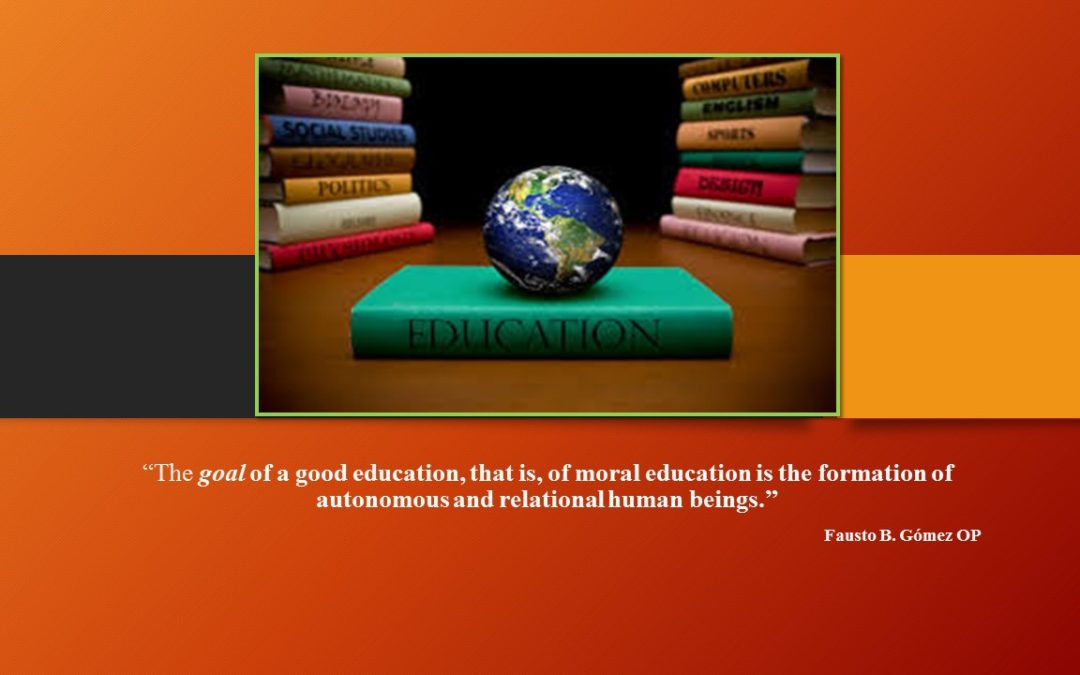
FAUSTO GOMEZ OP
We are told that about 70 million children worldwide do not go to school and around 1.7 million teachers are needed to provide a qualified primary education at a global level. As Malala Yousafzai, the young Pakistani girl wounded by the Taliban for attending school, says: A child, a teacher, a book, and a pen can change the world. Education is the only solution.
The right to education is one of the fundamental and universal human rights. Every person possesses by nature the right to education as essential part of human dignity. The person without a free basic education may be considered among the poorest of the poor. For Christians, instructing the ignorant is a spiritual work of mercy. St. Augustine and St. Thomas Aquinas affirm that the greatest work of mercy is helping human persons journey from the darkness of ignorance to the light of truth. As Pope Paul VI says, hunger for education is not less debasing than hunger for food: an illiterate is a human being with an undernourished mind. The ignorance of the culturally marginalized is, according to the Latin-American Bishops, an inhuman slavery.
The word education comes from the Latin verb educere, which means to draw out – the immense powers of the human being. Education is ordered through different activities to developing the potentialities of students as human beings, future professionals, believers and agents of social transformation.
Education is the process of a harmonious physical, psychological, mental, social, moral and spiritual development of the human being. It helps the human being become aware of his or her identity as an individual person and a social bei as a member of a family, a nation, the world. Education is a mediation of culture and the primary task of cultures. From a human and Christian perspective, education is the process thorough which the human being becomes free and responsible with and for others. In Christian perspective, education makes a necessary reference to Christ and to evangelical values: Christ is the foundation of the whole educational enterprise and the principles of his Gospel as primary educational norms (Vatican Congregation for Catholic Education, The Catholic School).
The agents of education are in the first place the family: parents in particular are the first and foremost educators of culture and faith. The schools have an essential role in educating our children and youth in human and cultural values. The Church contributes to the education of the youth through Catholic schools and universities and also through her parishes and various associations and communities. The ubiquitous and ambivalent means of education today are the mass media, in particular the internet pathways and its numberless windows. Education cannot be neutral. It radically involves the search for truth and the practice of goodness. In a world permeated by hypocrisy, appearances, and political correctness, the search for the truth is fundamental: In the truth lies the foundation of man dignity and freedom (John Paul II). To be truly educational and formative, the search for truth is accompanied by doing the truth in love.
Education is either according or opposed to basic ethical norms: the human person free and responsible is an ethical being. There is a radical need today of moral education. Moral education is aptly defined as a pilgrimage towards ethical maturity (W. Kay). Genuine moral education is not banking education, but problem-posing and problem-solving education. It is not an un-free or oppressive or domesticating education, but a free, responsible and liberating education. A fully human and integral formation implies the education of the intellect and of the will, including the education of the passions and emotions.
Moral education focuses on the formation of a true and upright conscience. In ethical perspective, the formation of conscience is achieved through the conquering of evil and sin, and the acquisition of virtues. Aristotle says: It would seem right for each man to help his children and friends towards virtue. Forming conscience requires practicing virtues. Deforming conscience, on the contrary, entails lack of interest in the truth and adherence to sin: It is possible to discard the decision of conscience for lack of moral virtues (St. Thomas Aquinas); a bad conscience may make a person “sightless as a result of habitual sin (Vatican II, Gaudium et Spes).
In this context, moral laws – which are rooted in natural law or the law of being human are part of an authentic process of education and are not opposed to a good conscience; rather, they strengthen and guide when duly interiorized – the decisions of a good conscience. Truth is a condition of freedom and also of conscience: Freedom of conscience is never freedom from the truth but always and only freedom in the truth (John Paul II, Veritatis Splendor). Conscience is not doing what one likes,but doing what is right. Indeed, only the truth will make us free (Jn 8:32).
The goal of a good education, that is, of moral education is the formation of autonomous and relational human beings. The means to achieve the goal are the knowledge and realization of among others – the values of autonomy, justice and love, including the main moral virtues, headed by prudence.
Forming a true and upright conscience involves educating in autonomy, in the promotion of the self-realization of the person in the search for authenticity and truth. The human person is a unique individual. His/her dignity implies his or her autonomy or self-determination. The human being develops personal autonomy through an education that begins in childhood as directive education, and becomes in youth and more so in – adulthood non-directive education. The path from heteronomy to true autonomy goes from the total dependence of the child to the relative independence of the adult. There is no absolute independence: all humans are social beings, and God creatures and stewards. And there should not be absolute dependence, as exemplified by slavery, extreme authoritarianism and paternalism: human beings are autonomous and free.
Human dignity implies not only autonomy but also relationship: every human being is autonomous and relational. Hence true education, including education of conscience, entails educating in otherness by aiding the educated to be human persons open to others and to God. Moral autonomy is realized when relationships with others are lived “in key of mutual and horizontal respectâ (Marciano Vidal).
The second value to be developed through moral education after and with autonomy is the value of justice, as the nucleus of moral and social axiology. Justice is the value, the virtue that inclines us to give to each person what is his or hers, in the first place his/her rights. Two main references of justice are: equality, meaning all humans are equal, and reciprocity, that is, equitative participation in social life (M. Vidal). The content of an education for justice, which is centered on human dignity and rights, is grounded on the four pillars of the social order – justice, truth, freedom and love – and guided by the ethical principles of the common good, solidarity and subsidiarity, stewardship, the universal destination of the goods of the earth, and the preferential option for the poor.
Radically, every human being is autonomous and relates in justice with others. However, justice needs the life of love, which is the third and the main value of education, moral education, and the formation of an upright conscience. In ethical and Christian perspective, love is the form of all virtues, that is, it gives life to all other virtues and values. Love inclines us to give to another person not only what is his or hers, but also of what is somehow ours. Love is the value and the virtue which defines our humanity and also our faith. Authentic love is grounded on truth, perfects justice, and expresses true freedom. Authentic moral education is perfected by the acquisition of virtues. Aristotle says: “It is not unimportant then to acquire one set of habit or another right from youth. On the contrary, it is very important, indeed all important. Main virtues to be acquired through the repetition of the corresponding acts and God grace – are the four interconnected cardinal virtues of prudence, justice, fortitude and temperance. Prudence, the virtue that judges and discerns and acts rightly is duly singled out: “Prudent education teaches virtue (CCC 1784; see also 2223).
For Christians and other believers, moral education is moral and spiritual education. Formation in the faith, catechesis, or religious instruction is for the Christian an essential element towards achieving moral adulthood and a Christian conscience. Well educated or instructed Christians are asked by their humanity and faith, to witness a true and certain conscience, to be free and responsible, to practice the seven virtues that make a Christian or believer: the three theological virtues of faith, hope and love which connect us to God -, and the four cardinal virtues of prudence, justice, fortitude and temperance which link us to other human beings and creation. Difficult? Virtues pray!
(Published by O Clarim, Macau Catholic Weekly: September 23, 2016)

Bro. Stephen Saw Lej O.P.
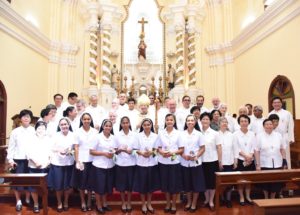
Together with the bishop, concelebrants and members of the Congregation
The Congregation of Missionary Dominican Sisters of the Rosary have been present in Macau since 1949. There are four communities of Sisters now in Macau and one of them is the formation house for new candidates in Taipa Peninsula. The novices go to the Philippines for their canonical year after accomplishing their studies at the University of Saint Joseph. Seven novices who had recently finished their novitiate, made their simple profession in the presence of Sr. Asunta Fang, the Provincial Coordinator of the Province of Queen of China.
The occasion was celebrated with the holy Eucharist presided by His Excellency Stephen Lee, Bishop of Macau. It took place at the chapel of Saint Joseph’s Seminary at 11:00 am, on 24 September 2016.
The bishop, in his homily, gave a short reflection regarding the religious profession, the meaning of religious life in the Church and the calling of God. He also encouraged the newly professed sisters to totally trust in their community, to imitate the simple living style of our Lady, the Mother of the Church, and to follow Jesus Christ steadfastly.
Some professors, students of Religious Studies, guests and relatives of the sisters and representatives from different religious congregations were also present during the mass. The Dominican friars and student brothers also gave their support to the celebration cooperating with the student sisters by singing hymns in the mass. The presence and prayers of the assembly accompanied and strengthened in many ways the newly professed sisters along their vocational paths.

Seven Newly Professed Sisters
The newly professed sisters are from different countries, namely:
(1) Sr. Nelia Soares Da Silva Pinheiro (East Timor)
(2) Sr. Leonarda Da C. Evangelista (East Timor)
(3) Sr. Mariana Dos Santos Barreto (East Timor)
(4) Sr. Roberta Moniz Soares (East Timor)
(5) Sr. Beatrix Thomasia Pias Kahlasi (Indonesia)
(6) Sr. Maria (Myanmar)
(7) Sr. Cherropihtun (Myanmar)

FAUSTO GOMEZ OP
When I was a student of philosophy, we had a holy and wise Master of Students, Fr. Luis López de las Heras. He gave us a lecture every Saturday morning. One lecture that lingered in my mind for life was his talk on silence, a silence he practiced in his humble Dominican life. Later on, I was moved by one of my favorite songs, “The Sound of Silence†of Simon and Garfunkel: the singers, the song, and the lyrics! It is enchanting. I love its title!
As human beings, as Christians in particular, we need to hear and listen to the sound of silence through our life. We are invaded, bombarded today by too many words, too many noises… Silence is a great value and virtue in all religions and faiths. The Church “must discover the power of silence†(Cardinal Luis Antonio de Tagle).
Silence is the other word. After the word, preacher Lacordaire says, silence is the second power in the world. Word and silence are two ways of speaking; two aspects of communication; the two sides of talking. Both words complement each other. “We all need the use of words, but to use them with power we all need to be silent†(John Main).
 I invite you to listen with me to words on the awesome sound of silence – not the sound of bad silence, but of good, virtuous silence.  There is, indeed, bad silence, like the silence that does not utter words when it should speak: “We believe, and so we speak†(II Cor 4:13). The Lord says to Paul: “Do not be afraid, go on speaking and do not be silenced, for I am with you†(Acts 18:9-10). The apostles Peter and John were asked by the Jewish authorities to keep quiet about the Crucified and Risen Lord. Their answer: We have to obey God, rather than men; “we cannot stop proclaiming what we have seen and heard†(Acts 4:19-20.
Leo XIII says that at times we ought not to be silent, we have to speak, as when he spoke powerfully of the poverty of workers at the end of the 19th century: “By keeping silence we would seem to neglect the duty incumbent on us†(Leo XIII, Rerum Novarum). The Christian is asked by his humanity and faith to speak on behalf of those who have no voice: children, women, the poor, the elderly, the migrants, and the marginalized.
Forced silence is also bad, such as the silence imposed by dictators and the like on others, on promoters of human dignity and rights, on peaceful followers of religions and faiths. Money, too, may force some of us to keep silent when we ought not: “When money talks, the truth is silent†(Chinese Proverb). Nowadays, moreover, it is not hard to find people who do not talk because speaking is not “politically correct.â€
Speaking of silence without adjectives usually means good, positive, healthy and holy silence. We need silence, good silence, not for the sake of silence, but as a way to know ourselves more deeply, to listen to God and his creation, to Jesus, God’s Son and our Savior, to our own hearts, and to all women, men – all creatures and children of God.
Silence is needed to hear the wordless voice of our heart. “Your hearts know in silence the secrets of the days and the nights†(Khalil Gibran). Silence is needed to listen to God, “to listen to the Voice: “I will keep silent and let God speak within†(Meister Eckhart). “Speak, Lord, your servant listens.†Like to the prophet Elijah, God speaks to us not in the hurricane, not in the earthquake, not in the fire; God talks to us in a light murmuring sound, in a “still small voice†(Cf. I Kgs 19:11-13). To hear God’s silent voice, our senses, our hearts must be silent: “I hold myself in quiet and silence, like a little child in his mother’s arms, like a little child, so I keep myself†(Ps 131:2).
Silence is needed to listen to God’s creation – to the stars, the ocean, the wind, the flowers, the birds. In his Encyclical letter Laudato Si (2015, Pope Francis invites us to contemplate God’s creation and to listen to its silent voice. He quotes St. John Paul II: “For the believer, to contemplate creation is to hear a message, to listen to a paradoxical and silent voice†(Laudate Si’ 85).
Silence is also needed to listen to others. Job tells his talking friends: “If you would only keep silent that would be your wisdom†(Jb 13:5). Pope Francis speaks of the importance of learning the art of listening, “which is more than simply hearing†and implies “an openness of heartâ€; he recommends “respectful and compassionate listening†(Evangelii Gaudium 171). Unfortunately, some if not many of us do not listen to others but just wait for them to finish their talking and continue with ours: “People talking without speaking; people hearing without listening…†(The Sound of Silence). We keep silent when our word will be hurtful to the other, or boastful or unkind. Then, as my father used to say, “La mejor palabra es la que está por decir†(the best word is the one not yet spoken). The great mystic St. John of the Cross advises silence when facing the lives of others: “Great wisdom is to keep silent and not to look to sayings, deeds or the lives of others†(Sayings of Light and Love).
We need silence to speak the saving word. In his Post-Synodal Apostolic Exhortation Verbum Domini (2010), Pope Benedict XVI recommends that the People of God be educated on the value of silence, which is needed to speak of and listen to the word. The word, in fact, “can only be spoken and heard in silence, outward and inwardâ€; “the great patristic tradition teaches us that the mysteries of Christ all involve silence†(VD 66). The liturgy speaks of “sacred silence,†which is recommended in the Eucharist, and in the recitation of the Psalms. Pauses of silence are also recommended when praying the Rosary, particularly at the beginning of each mystery.
The saints invite us to cultivate good silence in our lives. They practice the silence and silent prayer of Jesus. Like Saint Joseph, who feeling the hand of God accepts silently the motherhood of Mary and the mysterious life of Jesus (cf. Mt 1:24). He does not say a word. He just talks by the good deeds of his daily life attuned to God’s will. Like the Virgin Mary, the greatest saint, who kept all the things happening around Jesus in her heart (Lk 2:51): in her, “all was space for the Beloved and silence to listen†(Bruno Forte).
We are asked to be silent before God, who is usually silent when we talk to him. On the Cross, Jesus faced the silence of God, too. “Why have you abandoned me?†Jesus cried out from the cross. At times, we ask God: Why have you abandoned me? God’s answer was and is silence. The silence of God, yesterday and today in the midst of darkness, of desolation, of injustices and war is a mysterious silence unveiled in his love: “God so loved the world that He gave it his only begotten Son.†Why is the good Lord silent when we suffer? “God does not want suffering; He is present in a silent way†(E. Schillebeeckx). Why is God silent? St. John of the Cross says that God is silent because in his Son Jesus He gave us everything, and in the Word He has said everything (todo): “In giving us his Son, his only Word, God spoke everything to us at once in this sole Word – and He has no more to say.â€
On Good Friday, Jesus is silent: his serene silence to the many questions of Pilate and Herod; his calm silence to the cry of the people: “Crucify him! Crucify him!†His humble silence while he is horribly scourged at the pillar. Jesus is patiently silent through his whole passion; at times, he pronounces a few words which dramatize his talking silence. Jesus, the Suffering Servant of Yahweh “never opened his mouth, like a lamb led to the slaughter-house, like a sheep dumb before the shearers, he never opened his mouth†(Is 53:7; cf. Acts 8:32). Yes, “like a silent lamb, but in reality instead of a lamb we have a man, and in the man, Christ that contains everything†(Meliton de Sardis).
Word and silence are two ways of speaking, like the two eyes of the face of life, or the two wings of a bird. Word and silence are ordered to a third word: love, which is silently witnessed in good deeds. “A Christian knows when it is time to speak of God and when it is better to say nothing and to let love alone speak†(Benedict XVI).
The strongest voice of silence is silent love: “The language God hears best is silent love†(St. John of the Cross). Silent love is a most powerful sound: the sound of silence!
(Published in O Clarim, Macau Catholic Weekly: September 9, 2016)

The University of Saint Joseph is the only Catholic university in Macau and a good number of its professors, staff and students are also Catholics. Normally, four or five masses are yearly celebrated in different occasions, in order to attend to the spiritual needs of the members of the university. The Mass of the opening of the school year is one of the main Masses celebrated at USJ during the academic year.
The Eucharistic celebration started at 12:30 pm on the14 September 2016, at the Speakers’ Hall in NAPE-1 campus, USJ. The holy Mass was presided by His Excellency Bishop Stephen Lee Bun-Sang, accompanied by three concelebrant priests. Since the Mass was especially offered for the staff and students, the hall was fully occupied by the university’s population, among them some fifty Catholic students, present to attend the solemn Mass.
On the 14 of September, the Church also celebrates the feast day of the Exaltation of the Holy Cross. In his sermon, the bishop emphasized the harmonious cooperation among the professors, the staff and the students, by helping each other while carrying one’s own cross along the journey. Besides, he went on repeating that all the good and beautiful things should be carried out in this academic year under the guidance of the Rector, Fr. Peter Stilwell, as Moses, God’s chosen one, who successfully led the whole Israelite people in the desert with the providence of the heavenly Father.
The Mass ended with the blessing of the bishop. Hopefully, every one of us felt inspired and enhanced by the strengthening and encouraging words of our Pastor, in order to begin the new academic year with full rigor and attentiveness.
Bro. Stephen Saw Lej, O.P.
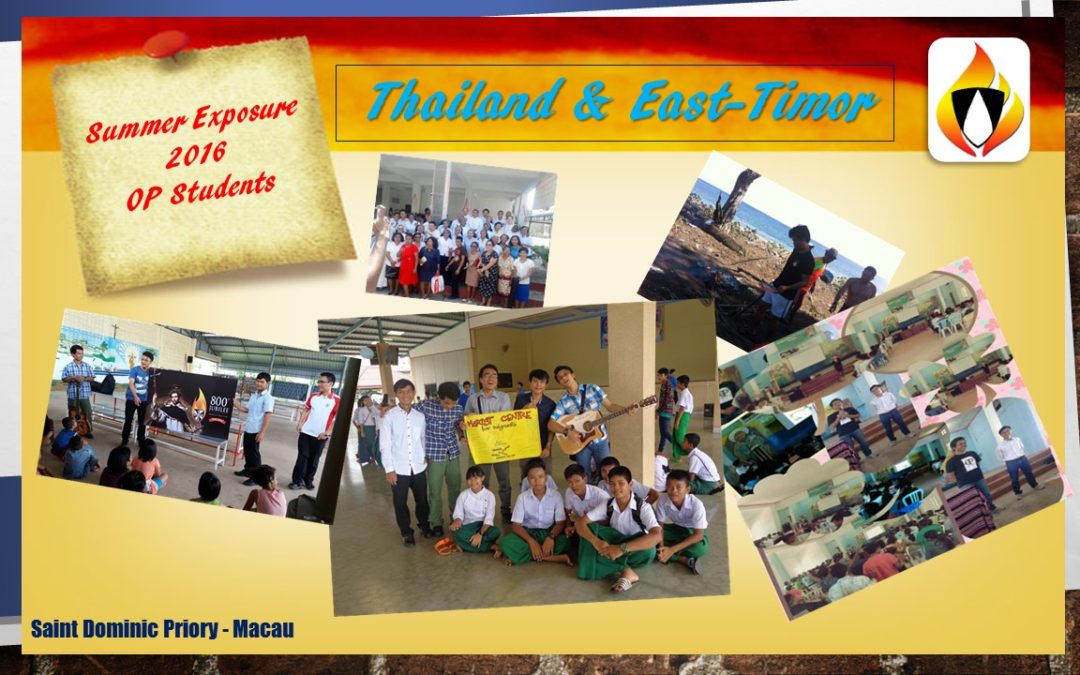
I – Pastoral exposure in Thailand
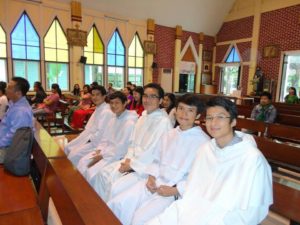
Br. Francis Nge Nge, Br. Santino, Br. Stephen, Br. Marko and Br. Francis Buling
      We, Br. Francis Nge Nge, Br. Stephen, Br. Santino, Br. Marko and Br. Francis Buling, went to Thailand for our summer pastoral exposure. While we were there, we stayed in one of the Religious Missionaries of St. Dominic’s communities in Samut Sakhon. Samut Sakhon is one of the central provinces of Thailand where there are many shrimp factories. The Dominican community we stayed in is situated in one of the poorest area in the province named Tha Chin (Mahachai) where there are many migrant workers from Myanmar. The main work of the Dominican Sisters there is to help teaching the children and to take care of them in the centers for the migrants’ children. With the invitation of the parish priest, Fr. Vitaya Ladloei, who oversees the centers and of the Sisters, we went to teach in those centers. There are three centers for migrants’ children, namely: St. Joachim center, St. Ann center and Marist center, and generally speaking, all of them are under the supervision of the parish priest. Among those three centers, St. Joachim center is originally and officially under the care of the Dominican sisters of Missionaries; the Marist center is under the care of the Marist Brothers, and St. Ann center is under the care of the St. Ann parish priest respectively. We had to teach in those centers from Monday to Friday from 8:30 in the morning to 3:30 in the afternoon. We were requested to teach the children the academic subjects such as: Math, Science, History, English and Burmese. We also helped the students play sports in the afternoon. Every Tuesday and Thursday evening, we had home visitation. On those evenings, the sisters, the Marist brothers, the teachers and we, went to the house of the students, mainly to visit their families and to discuss with the parents about how their children were doing in the centers.
      There were two secular priests from Myanmar residing next door to the Dominican Sisters’ community. They celebrated the Mass for us from Monday to Saturday and for the Sunday Mass, we went to the St. Ann parish. With the help of one of the Burmese priests called Fr. Albert, we were able to visit and meet the Myanmar Catholic youth who were working in different parts of Thailand. With the invitation of this priest, we were able to perform some pastoral works such as: sharing stories and experiences, explaining to them about the religious life, praying, worshiping and so on. Through sharing not only did we come to know each other but also we really came to understand each other’s life. There were also two Xaverian priests from Italy living in the neighborhood of the sister’s community. They also invited us to join them when they went to visit the poor in the slum area of Bangkok where they had their main pastoral work. Through their help, we were able to meet some of the Thai Catholic youth as well.
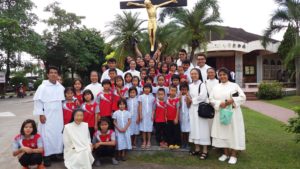
Brothers with Dominican Sisters and the migrants’ children.
      When the feast of Saint Dominic came, all the Dominican Missionary Sisters all over Thailand came together to celebrate the feast in one of their communities in Samphran. Dominican sisters from Vietnam province who were living nearby also came to join our solemn celebration. The Mass was solemnly presided over by a Dominican priest from the Vietnam Province and concelebrated by his fellows and a Dominican priest from the Australian Province. After the mass, followed a banquet. It was such a great joy to celebrate the feast of our founder together with the brothers and sisters from different provinces.
      We also had a wonderful travelling experience in Thailand. We travelled most of the time at weekends to different places. We went to visit many unique, historic and glorious temples all over Bangkok; to visit the historic city or ancient ruins of Ayutthaya;  to the elephant ground to see the elephant show, to Pattaya to visit the biggest park in Thailand; to some of the most famous shopping malls in Bangkok and we went to the wet markets around Bangkok where you can get any kind of sea product you want. We once even travelled to the north, Mea Sot, to visit one of the Dominican Sisters’ communities which was also an orphanage and we stayed there for a couple of days. Apart from spending the days playing games and having fun with the children there, we were also able to go to the border of Myanmar and see the life the migrant workers were living. Not far from that place, there was a community of Xaverian priests and we were invited to visit their community. When we went there, the fathers showed us the works they were doing. It was so fascinating to see how their works were making big impact on the community there and its surroundings.
Reflection
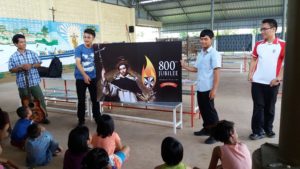
“we are telling you about our Dominican Order”
The experience we received from Thailand apostolate exposure is priceless and worth sharing. Since it was our first time to go for a mission in a country we had not been before and to meet the people we knew not, we learned many new things through this experience.
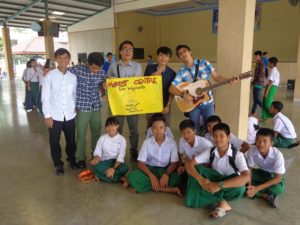
Enjoy every moment!
We were moved by the people who were really in need. We were happy to be there just to help them to be strong in mind even though we could not help them in their physical well-being. Despite the fact that we were not really well prepared for this mission, we were so happy to give them what we had. Most of the people we met in Thailand who were in real need were Buddhists. However, we were touched by the statement of a missionary priest who was helping them there. His statement is as follows: “Put aside what their religion is, and you will see they are just like us, another human beings. They are our closest neighbors and Jesus Christ taught us to love our neighborsâ€. Although our presence in the centers for the migrants’ children was a great help, we could see that it sometimes meant a big burden to the administrators of the centers because firstly, when they put us into their systematically run programs, they had to reorganize the whole thing just for the sake of us; and secondly, we were totally untrained for what we were to do and not really fit for the job. We finally would conclude that although we did not really make any big impact on the work there, we believe we did contribute something to what the sisters, the brothers and the teachers are doing. And most importantly, we are sure that all these experiences we had there would help us to serve others better in the future. Bro Santino, OP. Chronicler
II – Pastoral exposure in Timor-Leste
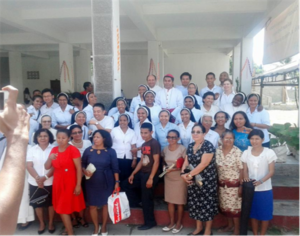
On the Feast of St. Dominic together with Bishop and Sisters
      This summer year experience was special for many of us and hopefully these experiences will remain with us to remind us and give us courage to face our studies meaningfully. As we are celebrate the 800th years anniversary of our Dominican establishment, we, the brothers also have a special privilege to feel and encounter the missionary works in different places in our province (The province of Our Lady of the Rosary). For the two of us (Bro Ignatius and Br Peter) we were in Timor-Leste for two and half months as summer exposure to stay with the brothers there and to have some experiences of the missionary works done by our brothers in Timor-Leste.
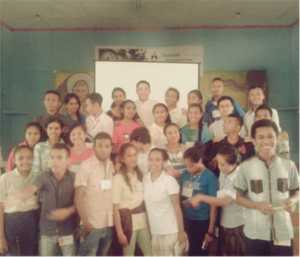
At Youth gathering
It was remarkable period for us, for we not only see and experience the missionary works of our brothers but also we had chances to experience the cultures of the local people and their lives. We had the opportunity to live with and accompany our brothers who are working there by helping out with daily works in the house and going with them to the villages to minister the sacraments. The people are nice in a sense that they have highly respect and reverence for the missionaries like Father and Sisters and also they have beautiful cultures.
Since we are celebrating 800 years Jubilee of the Order, we also had a chance to participate in a special events which organized by Dominicans Family in Timor-Leste, the solemn feast of St. Dominic and Youth gathering as to mark special year celebration of the Order in Timor-Leste.
      Indeed, for us the summer exposure experiences had been a meaningful and remarkable impression, which we like to repeat if there is a chance.
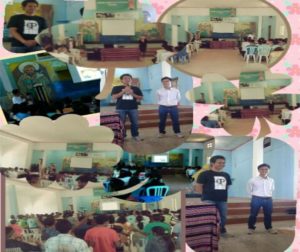
Sharing with Youth about our calling
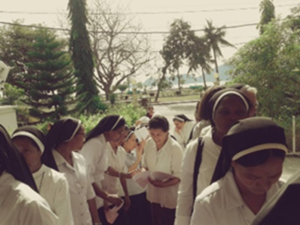
Dominican Sisters
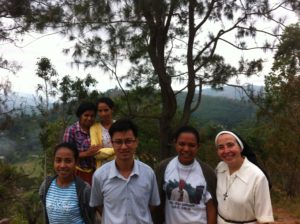
A happy time with Sisters
















